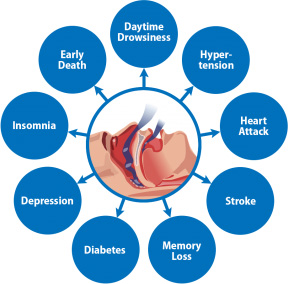The most common questions I get in the sleep program have to do with the effects of weight loss and weight loss surgery in sleep apnea.
I always respond with helping people understand Obstructive Sleep Apnea; what it is and why it occurs.
The definition for Obstructive Sleep Apnea is; “a cessation of breathing followed by a snore, then an oxygen desaturation.” That means – you stop breathing when you sleep. So, why do some stop breathing when they sleep?
All of us are born with tonsils, adenoids and soft tissue in the backs of our throats. For some, the tonsils can be enlarged or the soft tissue be excessive. Either way, this can cause a narrowing of the airway that causes shallow or labored breathing when sleeping. The tonsils and/or soft tissue falls back into the throat causing a blockage in your breathing. That blockage is then followed by a snore, gasp, cough or choking. This is your body’s way of restarting your breathing.
When your body has sleep disordered breathing, your oxygen will drop quickly and your heart rate slows down each time this happens. Over time, this can cause harm to your internal organs including your heart and lungs. This can cause hypertension and heart disease. This can also cause a stroke. Because of the obstruction in your throat, you are depriving your body and brain of oxygen. Medically, untreated sleep apnea can cause death.
Obstructive Sleep Apnea also causes excessive daytime sleepiness, tiredness and memory loss. Our brains go through different stages of sleep throughout the night. Each stage of sleep has different depths. Some stages are lighter while others are much deeper. The purpose for these different stages is to obtain the best sleep needed for our overall health and well being. The deeper stages help our brains and muscles rest. But if we are suffering from Obstructive Sleep Apnea, we are  unable to reach the deeper stages of sleep until very late in the night or not at all because of the constant interruptions to our sleep cycle from the sleep disordered breathing. If we are unable to get enough of the deeper stages of sleep, we will suffer from falling asleep when we should be awake, lack of energy and forgetfulness.
unable to reach the deeper stages of sleep until very late in the night or not at all because of the constant interruptions to our sleep cycle from the sleep disordered breathing. If we are unable to get enough of the deeper stages of sleep, we will suffer from falling asleep when we should be awake, lack of energy and forgetfulness.
While the causes for this excessive tissue is different for every individual, weight loss and weight loss surgery has the potential to resolve sleep apnea. However, not everyone’s sleep apnea is fixed with weight loss or weight loss surgery. After you reach your goal weight, or as close to it as you want to be, you can be retested to see if you still have a diagnosis of Obstructive Sleep Apnea. In many cases the OSA is resolved, in others, the OSA may be dramatically reduced which may still require treatment with CPAP but at a significantly lower pressure. Weight loss and weight loss surgery, in general, will improve your quality and quantity of life and so will treatment for Obstructive Sleep Apnea.
Written by: Erika Keech, RPSGT
Sleep Medicine Coordinator with The Bariatric Center of Kansas City










